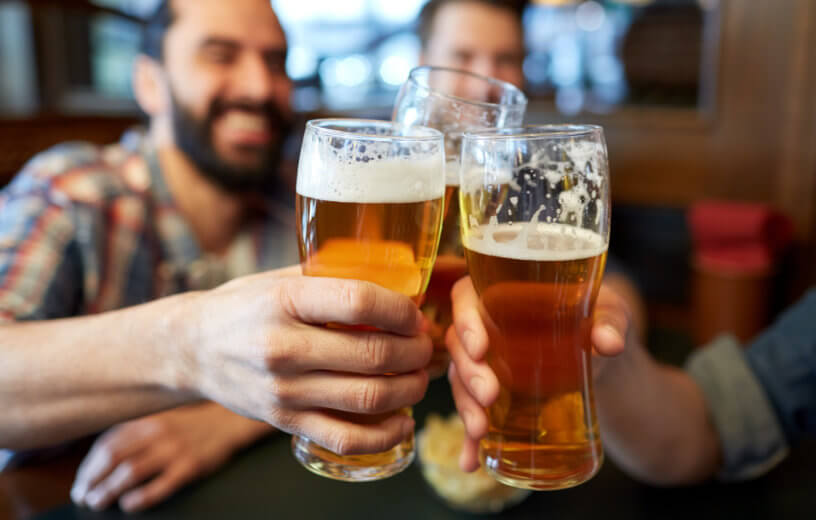SYDNEY — Booze could actually help people shed extra pounds — as long as they nosh on nuts and other healthy bar snacks, according to new research. High-protein foods soak up alcohol without leading to pot bellies and love handles, say scientists.
Alcohol fuels the “munchies,” but needn’t necessarily cause weight gain. It has been dubbed the “aperitif effect.” The findings are based on 9,341 Australians. Participants were from the Australian National Nutrition and Physical Activity Survey, the largest and most comprehensive of its kind. As expected, those who drank alcohol consumed more savory foods.
The University of Sydney study finds that drinkers who opted for high-protein, lean foods consumed fewer calories overall than people who abstain from drinking entirely. Such snacks include olives, popcorn, cocktail onions, deli meats, cheeses, raw veggies, dips and dried or fresh fruit.
“This was associated with decreased energy intake in some, but increased energy intake in others,” says senior author David Raubenheimer, a professor of nutritional ecology at the University of Sydney, in a statement per SWNS.
Do people consume fewer calories when drinking alcohol?
Around two thirds of participants chose foods high in protein, but low in carbohydrate and fat, such as lean meats, poultry, fish, seafood, nuts and legumes. Analysis showed they consumed an average 1,749 calories daily, including those from alcohol. This was 577 fewer than they needed to maintain current weight, and 451 less than the 2,200 racked up by the non-drinkers.
The other third picked potato chips, pigs-in-blankets, processed meats, garlic bread, spring rolls and potato wedges, which have the “umami” taste without the protein. They consumed an average 3,051 calories on average — 813 more more than their EER (estimated energy requirement). Over time, it increases the risk of obesity.
“It’s known alcohol increases appetite, particularly for savory food, a phenomenon that’s known as the ‘aperitif effect,'” says lead author Dr. Amanda Grech, a postdoctoral research fellow at Sydney. “Recent research has shown levels of FGF-21 – a hormone that increases protein appetite and suppresses appetite for sweetness – increase after alcohol is consumed. It’s also known protein has a satiating effect. We wanted to find out whether people select more protein-rich savory foods when drinking alcohol and, if they do, whether the satiating effect of additional dietary protein leads to them taking in fewer calories overall, despite the additional energy from alcohol itself.”
‘Nutritional geometry’
Alcohol is energy dense. But evidence it contributes to weight gain is inconclusive. The latest study is the first to take into account other dietary components.
Prof Raubenheimer and colleagues used a technique he invented himself called “nutritional geometry.” It untangles multi-dimensionality of diet – enabling multiple components to be observed simultaneously.
Data included the food and drink each individual had consumed over a 24-hour period and the total amount of energy it contained. It also contained information on how much came from protein, fat, carbohydrates and other nutrients. Four-in-ten (40%) volunteers had consumed alcohol.
The researchers said results indicate despite the large sugar content, drinking need not necessarily lead to weight gain. But in the current environment low-protein, high-fat snack foods are abundant and inexpensive. So alcohol may indeed be contributing to the obesity epidemic.
“When consuming alcohol and your appetite is elevated, make sure you select healthier lean protein sources such as lean red meat, chicken, fish, seafood or legumes and avoid the urge to snack on low-protein, savory snack foods,” adds Grech. “This will ensure that your protein appetite is satisfied without over consuming energy, leading to weight gain. Above all, be sure to stick within the guidelines for alcohol intake, which poses health risks other than weight gain and obesity.”
The researchers suggest those who wish to eat healthily while consuming alcohol snack before, rather than instead of, a meal. Suitable snacks include a serving of cheese (40g), unsalted nuts, chickpeas and vegetable sticks with tzatziki or hummus made with fresh ingredients.
The findings were presented at the International Congress on Obesity in Melbourne, Australia.
South West News Service writer Mark Waghorn contributed to this report.
You may also be interested in:

so does cocaine and meth ,whats the point
wine,beer,or spirits?
Not sure what they’re selling here, but people in the terminal stages of alcoholism actually die of starvation, because they cannot eat at all. That’s why they’re so emaciated when they die, too. So I guess emaciated is “losing weight”.
Cigarettes also help weight loss…
I agree. It seems the US didnt have an obesity problem till they started going after cigarette smokers. I stopped smoking for 7 years, and went from 160 lbs to 265 lbs. My knees hurt all the time, my back ached, I was always out of breathe, so I ultimately decided it was better to smoke than to be 100 lbs overweight.
Anecdotally, when I was drinking I was much thinner, more attractive, had more energy and more sex. Then I got married. Got fat and ugly, no energy and no sex. I’d like to see a study on this.
Additionally, if you eat only 1 piece of birthday cake per day, and nothing else, you’ll also lose weight. While equally impractical as this alcohol advice, I would take grant money to study it!